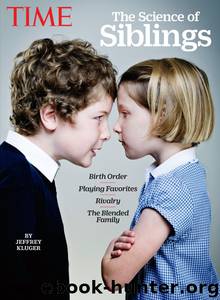TIME the Science of Siblings by The Editors of TIME

Author:The Editors of TIME
Language: eng
Format: mobi, epub
Tags: FAMILY & RELATIONSHIPS / Siblings
Publisher: Liberty Street
Published: 2016-03-17T17:00:00+00:00
6 Siblings in Story Land
How Kin in Pop Culture Are Signs of Our Times
By Charlotte Alter
ABC’s long-running show Modern Family has something for everyone: marriage (first, second and same-sex), child-rearing (of babies, step- and adopted children), and the hilarity that ensues.
IN REAL LIFE, SIBLINGS CAN BE A PAIN: THEY STEAL YOUR clothes and take the car keys and tell Mom and Dad when you go to a party the folks weren’t supposed to know about. But that’s just your siblings, the people who wore out your future hand-me-downs and somehow always manage to sit in the front seat. Fictional siblings, in TV shows and movies, are something else entirely. As with almost every other relationship, siblings are much more interesting when they’re not your own.
Sibling narratives don’t usually have the timeless passion of love stories or the perennial adventure of a quest. Instead, they’re windows into how we establish our identity. Stories about brothers and sisters are ultimately psychological squabbles between who they are and who they might have been. Our siblings—and for now, we’re talking about full biological siblings—are the ultimate representations of what you would have been like if Mom’s and Dad’s genes had reshuffled in a slightly different combination, at a slightly different time. They signify all the different ways to be your parents’ child. They’re you, but not quite.
In that sense, stories about siblings reflect how people of a particular time and place thought about identity, and how that identity can be seen through the lens of history. For example, Old Testament stories about biblical siblings often boil down to stark conflicts, usually as a duality: good vs. evil (Cain and Abel), firstborn vs. second-born (Esau and Jacob), fertile vs. barren (Leah and Rachel). Isaac and Ishmael, half brothers and sons of Abraham, are widely interpreted to be the forefathers of different but related faiths: Judeo-Christianity and Islam.
In Greek (and later, Roman) mythology, siblinghood was used to personify the connections between the world’s most powerful forces. That’s why Zeus, the god of the sky; Poseiden, god of the sea; and Hades, god of the underworld, are all brothers. Their sisters Hera, Demeter and Hestia signify the linked realms of family, harvest and home. And brothers Ares and Haphaestus, sons of Zeus and Hera, are the gods of war and weaponry. If mythology is an attempt to make sense of the natural world, then divine siblinghood is a way to link the mysteries of the universe into a recognizable family structure.
In Shakespeare’s time, siblings became a useful narrative device. In his plays, siblings are mostly used to illustrate the close link between family and destiny, even when characters are lost at sea or in disguise (think of the two pairs of twins in A Comedy of Errors or Viola and Sebastian in Twelfth Night). The repeated idea that a shared bloodline would bring back people from shipwrecks or reveal true identities reflects the Elizabethan obsession with family lineage as an indicator of fate.
Moving into the 19th and
Download
TIME the Science of Siblings by The Editors of TIME.epub
This site does not store any files on its server. We only index and link to content provided by other sites. Please contact the content providers to delete copyright contents if any and email us, we'll remove relevant links or contents immediately.
Should I Stay or Should I Go? by Ramani Durvasula(7667)
The Lost Art of Listening by Michael P. Nichols(7506)
The Rosie Project by Graeme Simsion(6412)
Beartown by Fredrik Backman(5754)
We Need to Talk by Celeste Headlee(5615)
Ego Is the Enemy by Ryan Holiday(5447)
Hunger by Roxane Gay(4927)
Suicide Notes by Michael Thomas Ford(4827)
I Love You But I Don't Trust You by Mira Kirshenbaum(3875)
Mummy Knew by Lisa James(3691)
Not a Diet Book by James Smith(3425)
Crazy Is My Superpower by A.J. Mendez Brooks(3400)
Toxic Parents by Susan Forward(3292)
Girl, Wash Your Face by Rachel Hollis(3282)
The Complete Idiot's Guide to Coping With Difficult People by Arlene Uhl(3149)
The Social Psychology of Inequality by Unknown(3029)
Name Book, The: Over 10,000 Names--Their Meanings, Origins, and Spiritual Significance by Astoria Dorothy(2987)
The Hard Questions by Susan Piver(2972)
The Gaslight Effect by Dr. Robin Stern(2793)
